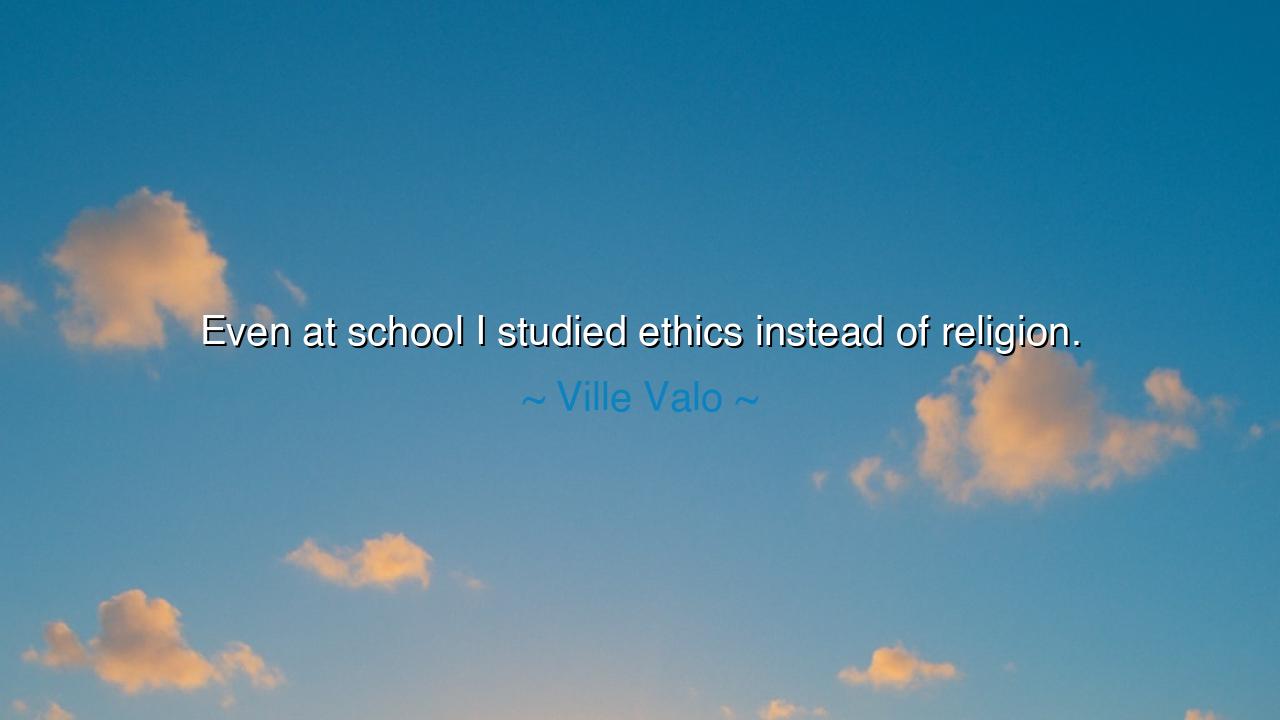
Even at school I studied ethics instead of religion.






In the grand dance of human thought, where the pursuit of truth intertwines with the search for moral guidance, there are those who turn not to the traditional teachings of religion, but to the deeper and perhaps more universal study of ethics. The words of Ville Valo, "Even at school I studied ethics instead of religion," reflect a deep and often unspoken truth about the nature of human morality—a truth that transcends the boundaries of religious doctrine and speaks to the core of what it means to be human. For Valo, as for many, the pursuit of ethics is not bound to a particular faith or tradition, but is a broader, more inclusive quest to understand how we ought to live, what is right and just, and how we relate to others in a world filled with both beauty and suffering.
In ancient times, the study of ethics was the foundation of much of philosophical thought. Great minds such as Socrates, Plato, and Aristotle did not simply seek to explain the world, but to understand the good life—the life that is lived in harmony with virtue, justice, and wisdom. Socrates famously said, "The unexamined life is not worth living," implying that a life lived without reflection on ethics—on the questions of what is right and wrong, what is just and unjust—was a life incomplete. The great philosophers did not just teach religious dogma, but sought to understand the fundamental principles that underlie human existence, that guide our actions, and that determine our moral compass.
But even as these ancient philosophers emphasized ethics as a way of life, many religions have been deeply intertwined with these questions. Religion often presents itself as a path to understand the divine will, a set of instructions for how to live in a morally upright way. However, as Valo’s words suggest, there are those who see ethics as something apart from, or even more fundamental than, religion. To them, ethics is not bound by belief in a deity or adherence to specific religious rites, but is a universal framework—a way of guiding human beings to live with integrity, compassion, and respect for the world and its inhabitants. In this sense, ethics can be seen as the moral foundation upon which religion itself can be built, for every religion seeks to answer fundamental ethical questions: How should we treat others? What is justice? What is the nature of goodness and evil?
Consider the life of Mahatma Gandhi, who, though deeply spiritual, famously embraced the principles of ethics—nonviolence, truth, and compassion—above the dogmas of any one religious tradition. Gandhi’s approach to life was shaped by an ethical commitment to ahimsa, or nonviolence, which transcended religious boundaries. He believed that the ethical imperatives of life—justice, equality, respect—were more important than the strict observance of religious rituals or belief. His ethical stance was rooted not in the religious doctrines of his time but in a profound commitment to humanity and moral principles that could unite all people, regardless of their faith. His life exemplifies the power of ethics as a guiding force for moral action, showing us that the path to a better world lies not only in adherence to religious beliefs, but in the living out of ethical values that honor the dignity of all people.
Valo’s words also remind us of the tension that exists between religion and ethics in the modern world. Many people, especially in secular societies, may find themselves distanced from the traditional doctrines of religion, yet still deeply concerned with ethics. These individuals, like Valo, may turn to ethics as the cornerstone of their moral reasoning, seeking a more universal and inclusive understanding of right and wrong that does not rely on the authority of religious institutions. This shift reflects a broader movement in which ethics is seen as a language common to all people, regardless of their religious background, and one that is more adaptable to the complexities of modern life.
The lesson of Valo’s words is not that religion is unimportant, but that ethics—the study of how we should live, what we owe each other, and what is just—can and should stand on its own, as a moral framework that guides us toward a better world. Religion, when it focuses on ethical teachings, can provide profound insights into the human condition. But even in the absence of religious faith, we can seek to live moral lives grounded in ethics, rooted in the principles of honesty, compassion, and justice. Ethics, in this sense, is not about abstract philosophy, but about how we engage with one another in the world.
In our own lives, let us seek to embody these ethical principles—not as followers of a doctrine, but as human beings who recognize the importance of living with integrity and compassion. Whether we turn to religion for guidance or not, let us live as though the ethical imperatives of life are the highest calling. Let us treat others with respect, pursue justice, and act with honesty and kindness, understanding that our lives are the living testament to the ethical values we choose to uphold. Let ethics be the compass that guides our actions, just as religion guided those before us, leading us all to a more just and compassionate world.






AAdministratorAdministrator
Welcome, honored guests. Please leave a comment, we will respond soon